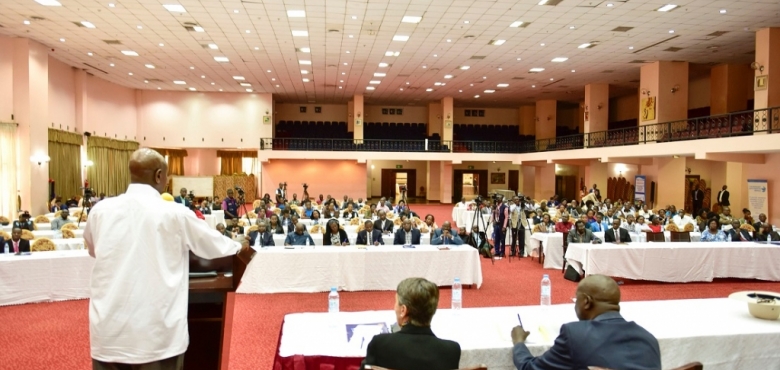President Yoweri Museveni was chief guest at the 25th anniversary celebrations of Transparency International, Uganda Chapter, in Kampala yesterday where he thanked them for giving him an award in recognition of his fight against corruption.
“On Monday December 10th, I will announce new measures and the direction we shall take in our renewed fight against corruption,” said the president.
“That said, there is corruption in Uganda. It stems from the colonial times. However, when we undertook the liberation struggle of this country, there were more pressing problems than corruption,” he added.
Mr Museveni went ahead: “These were; extra-judicial killings by state actors between 1966 to 1986. We lost about 800,000 people in that period. Luweero Triangle alone saw about 300,000 people killed.”
Mr Museveni add the following observations:
There was the problem of no democracy. After holding elections in April 1962, the next elections were in 1980 and they were bad elections. It was a whole 18 years of no elections.
The third challenge was the collapse of the economy. By 1986, the economy was characterized by three words; Magendo (smuggling ), kikubo (black market) and kusamula (speculation).
Because of these three, we then had the collapse of infrastructure. Uganda had one electricity station, built by the British with a capacity of 150MW but was only producing 60MW by 1986.
The other problem was poaching. Most wildlife in national parks were on the verge of extinction. For example we had no elephants, with those that had survived poachers seeking refuge in DR Congo. The white rhinos disappeared totally.
When the revolution succeeded, we had few intellectuals. Most of our fighters were peasants or those who had dropped out of school early. The only institution we immediately reformed was the army–where we created the UPDF and destroyed the old armies.
Today, whenever any researcher asks what institution the public trusts, the UPDF comes out on top. Those fighting corruption must look at the army as the nucleus of this struggle.
But even when we changed the army, the other institutions like the civil service, the Judiciary, the education system and others stayed as we had inherited them. Had we, for example, dismissed the civil servants, we would have created problems and isolated ourselves.
We also made the mistake of assuming that elected leaders would diligently serve in their people’s interests. We gave people power to elect leaders, who instead of offering oversight have joined the corrupt class.
However, corruption will now be defeated. The corrupt civil servants have exposed themselves. The population is angry with them. Also, we now have more educated young people. The pool from which to pick their replacements has grown.
The problem now is the law manipulated by corrupt civil servants. We now need quicker methods of accountability to deal with the corrupt. I have the political will but I do not want to deal with them outside the law.
I do not want to lead a country which is timid, or one with civil servants living in fear. We shall deal with the the corrupt officials structurally.
There must also be a reflection on the morals of our young people. When setting up the Uganda Revenue Authority, we carefully identified young people to work there. But now, URA has kawunkumi (weevils). We need to deal with it.
I was also told that poor remuneration fuelled corruption but even in agencies like URA, Bank of Uganda, Kampala Capital City Authority, where the pay is competitive, there exists corruption.
All in all, we shall defeat corruption. Like I said, I will make major pronouncements on December 10th in our new fight against graft. I urge Ugandans to listen in.




